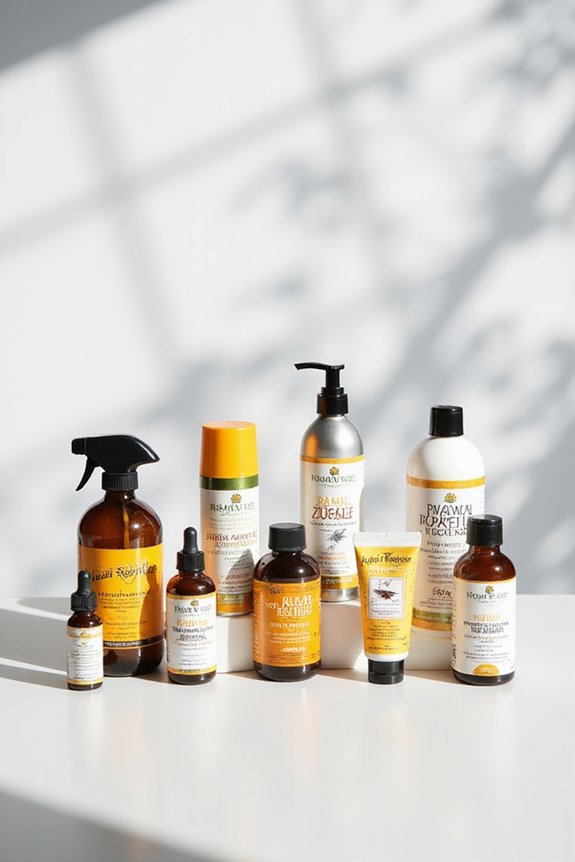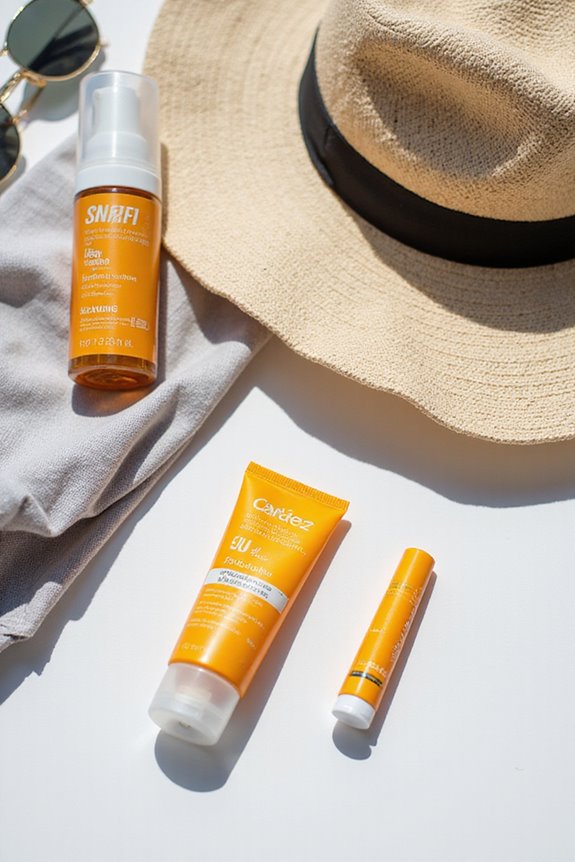Finding the best insect repellents for outdoor fun means balancing effectiveness and comfort. DEET is a classic choice, providing hours of protection, but it can be greasy. Picaridin is a fantastic alternative—no sticky residue or nasty odor! For those who prefer natural options, oil of lemon eucalyptus offers decent protection. Ben’s Tick Wipes and Repel Lemon Eucalyptus are popular picks. Plus, Thermacell devices create bug-free zones. Stick around, and discover more tips for keeping those pesky bugs at bay!
Key Takeaways
- DEET-based products like Ben’s Tick & Insect Repellent Wipes offer long-lasting protection, especially effective in concentrations of 25-30%.
- Picaridin, found in products like Sawyer Picaridin, provides similar efficacy to DEET without a greasy feel or strong odor.
- Oil of Lemon Eucalyptus, such as Repel Lemon Eucalyptus, is a natural alternative, though less effective for prolonged outdoor activities.
- Permethrin-treated clothing and gear provide effective insect defense without applying directly to the skin.
- Thermacell Portable Repellers create mosquito-free zones, ideal for outdoor gatherings and events.
Understanding Active Ingredients in Insect Repellents
When it comes to enjoying the great outdoors, understanding the active ingredients in insect repellents can make or break a day of hiking or picnicking. DEET is the reigning champion, boasting strong protection for hours, but it can be a fabric destroyer. Enter picaridin, a synthetic alternative that repels pesky bugs without the greasy feel or odor. Then there’s oil of lemon eucalyptus, a natural contender offering moderate protection, although it doesn’t quite stack up against DEET or picaridin. With emerging options like nootkatone, the battle of synthetic versus natural continues. Making active ingredient comparisons is essential; knowing what works best for your adventure can mean the difference between a delightful outing or a bug-infested nightmare!
Types of Insect Repellents Available
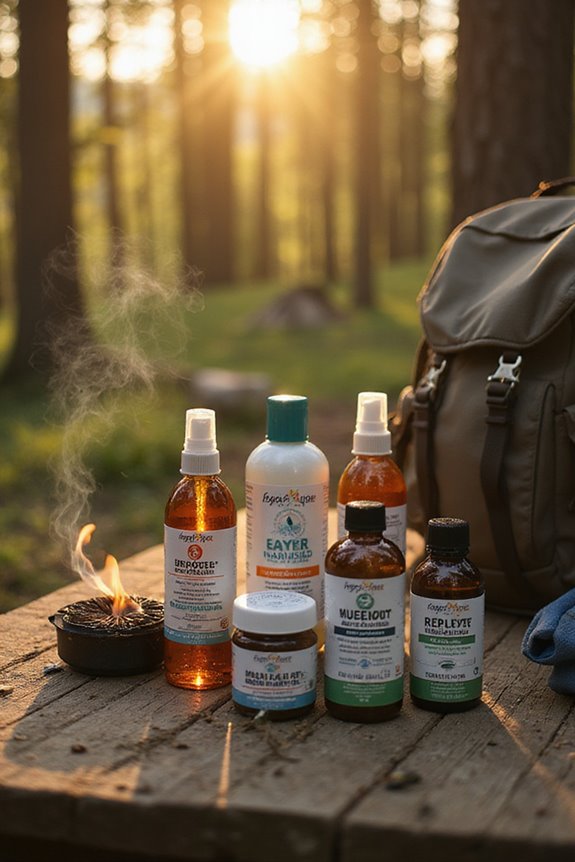
In the world of outdoor adventures, choosing the right insect repellent can feel like maneuvering through a minefield of options. There are chemical-based repellents like DEET and picaridin, known for their long-lasting protection, yet some folks cringe at the thought of harsh chemicals. Enter natural alternatives, such as Oil of Lemon Eucalyptus and essential oils, which offer a milder approach, albeit with shorter protection times. For targeted applications, permethrin-treated clothing and gear provide a solid defense against those pesky ticks and mosquitoes without slathering anything on the skin. Whether you’re lighting citronella candles or applying a plant-based spray, finding the right repellent may take a bit of trial and error—but it’s worth it for the great outdoors!
Safety Considerations When Using Repellents
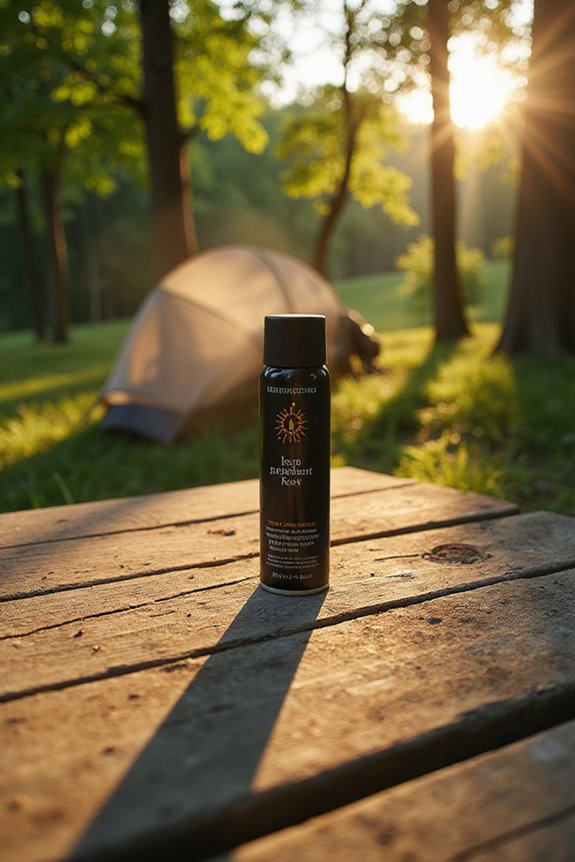
Choosing the right insect repellent is just the beginning; using it safely is a whole different ballgame. When it comes to repellent application, it’s essential to apply products only to exposed skin and clothing, steering clear of sensitive areas like the eyes and mouth. For child safety, parents should avoid using certain ingredients, like oil of lemon eucalyptus, on kids under three. Instead, opt for the lowest effective concentration and apply it sparingly, especially around the face and hands. After a day outdoors, a quick wash of kids’ skin and clothes can help remove any lingering residue. Remember, safety first! So, while enjoying the outdoors, keep those pesky bugs at bay without compromising health.
Effectiveness Ratings of Popular Ingredients
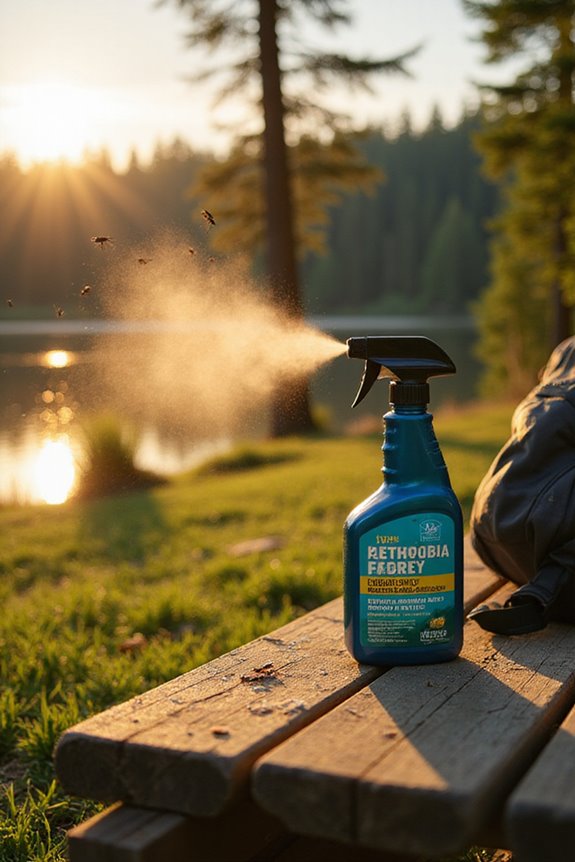
Selecting the right insect repellent can feel a bit like traversing a maze, especially with the countless options available. At the forefront is DEET effectiveness, renowned for its potent protection against mosquitoes and ticks, particularly in concentrations of 25-30%. Users often rave about its long-lasting power, although lower concentrations may leave them itching for more. Then there’s Picaridin, which offers a compelling comparison, delivering similar results without the greasy feel or strong odor. Many users appreciate its skin-friendly nature, especially for family outings. While both ingredients shine, DEET remains the gold standard, but Picaridin’s appeal is undeniable. Ultimately, the choice depends on personal preference and specific outdoor adventures, as each ingredient brings its strengths and quirks to the table.
Recommended Products for Outdoor Use

When venturing into the great outdoors, the right insect repellent can make all the difference between a blissful day in nature and a frustrating battle against pesky bugs. For those who swear by DEET, products like Ben’s Tick & Insect Repellent Wipes and Wilderness Formula Pump offer robust protection against mosquitoes and ticks, especially at 25-30% concentrations. However, if you prefer a DEET-free option, Repel Lemon Eucalyptus and Sawyer Picaridin are fantastic alternatives that won’t ruin your gear. Seasonal considerations also matter; for summer gatherings, Thermacell Portable Repellers create mosquito-free zones, perfect for outdoor events. Product comparisons show that whether you choose sprays, wipes, or innovative devices, the right repellent can transform your adventure into a bug-free experience.
Tips for Maximum Protection Outdoors
To guarantee a bug-free adventure, mastering the art of applying insect repellent can be just as essential as choosing the right product. Start by shaking the container well; a good mix guarantees those pesky active ingredients are ready for battle. Spray from 4 to 8 inches away, targeting only exposed skin and clothing. Remember, sunscreen goes on first—wait about 15 minutes before the repellent makes its appearance. When it comes to clothing, light and loose fits are your friends, while breezy spots can offer a natural shield against mosquitoes. And hey, avoid those sweet-smelling lotions; they only serve to attract unwanted guests. With these application techniques and environmental strategies, a bug-free experience is within reach!
The Growing Trend of Plant-Based Repellents
As the sun dips below the horizon and the evening air fills with the buzz of insects, more people are turning to plant-based repellents, drawn by their promise of safety and eco-friendliness. This growing trend reflects a shift in consumer preferences, as folks increasingly seek natural solutions to fend off pesky bugs. With plant-based innovation at the forefront, products made from extracts like rosemary, lemongrass, and lemon eucalyptus are gaining traction, offering a variety of options. Not only are these repellents gentler on the skin, but they also align with a desire for sustainable living. While they may not last as long as synthetic alternatives, their appeal lies in the natural ingredients and the peace of mind they provide, making them a popular choice.
Frequently Asked Questions
Can I Use Insect Repellent on Pets?
Using insect repellent on pets requires careful consideration of pet safety. Repellent ingredients like DEET can be toxic, so it’s crucial to choose pet-safe alternatives and consult a veterinarian before application to guarantee their well-being.
How Long Do Insect Repellents Remain Effective After Application?
Insect repellents’ application duration varies considerably, influenced by repellent factors such as active ingredient concentration, environmental conditions, and physical activities. Higher concentrations generally offer longer protection, while specific formulations target different insects with varying effectiveness.
Are There Any Natural Alternatives to Commercial Insect Repellents?
In a garden of fragrant possibilities, natural alternatives to commercial insect repellents bloom. Essential oils and homemade recipes whisper promises of protection, yet their effectiveness often pales compared to synthetic counterparts, leaving users yearning for stronger shields.
What Should I Do if I Experience a Reaction to a Repellent?
If experiencing skin sensitivity or allergic reactions to a repellent, one should wash the affected area thoroughly, apply soothing creams, and seek medical advice if symptoms persist, while discontinuing use of the product immediately.
Can Insect Repellents Affect the Effectiveness of Sunscreen?
Insect repellents can affect sunscreen absorption, particularly with repellent ingredients like DEET, which may degrade sunscreen effectiveness. Proper application sequence is essential to preserve both products’ efficacy and protect against UV and insect exposure.

